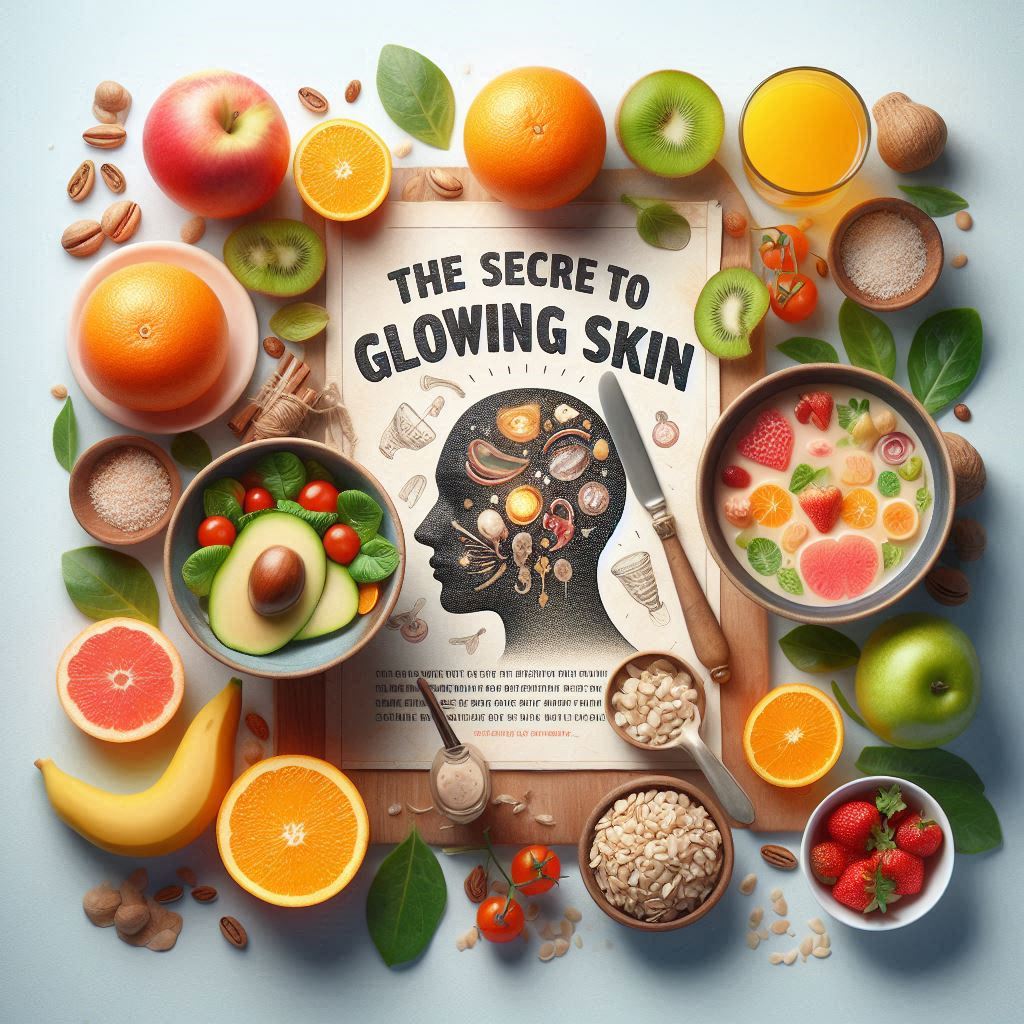
The Secret to Glowing Skin: What Your Diet Reveals!

Introduction
In the pursuit of radiant, healthy skin, we often turn to an array of skincare products promising miracles. Yet, what if the key to unlocking our skin’s natural glow lies not just in creams and serums, but in the foods we eat? Welcome to our exploration of how nutrition plays a pivotal role in skincare, offering insights into achieving that coveted luminosity from within.
Starting Your Day Right
Kickstarting your day with the right beverages can set the tone for your skin’s health. Consider beginning with a glass of warm water mixed with lemon and honey, or enjoy fresh aloe vera or amla juice diluted in water for an excellent dose of vitamin C. These options not only help to kick-start your metabolism but also prepare your skin to absorb the nutrients you’ll consume throughout the day.
Section 1: Understanding the Skin-Nutrition Connection
Delving into the science behind how our dietary choices impact skin health reveals a fascinating connection. Key nutrients play vital roles in maintaining the integrity and vitality of our skin:
- Vitamins: Vitamins A, C, and E are particularly significant. Vitamin A promotes skin repair and cell turnover, found abundantly in sweet potatoes, carrots, and leafy greens. Vitamin C is essential for collagen synthesis and acts as a powerful antioxidant, available in citrus fruits, strawberries, and bell peppers. Meanwhile, Vitamin E protects the skin from oxidative stress and supports overall skin health, found in nuts, seeds, and avocados.
- Minerals: Minerals like zinc and selenium are crucial for skin integrity. Zinc aids in wound healing and helps maintain the skin barrier, while selenium protects skin cells from damage, found in Brazil nuts and seafood.
- Essential Fatty Acids: Essential fatty acids, particularly omega-3 and omega-6, play a crucial role in preserving skin moisture and elasticity. Incorporating sources such as fatty fish like salmon, flaxseeds, and walnuts into your diet can help meet these essential fatty acid requirements.
The concept of nutricosmetics also emerges, indicating that dietary supplements can complement topical skincare routines, providing comprehensive nourishment to our skin from the inside out.
Section 2: Foods for Radiant Skin
A diet rich in antioxidants, phytonutrients, and hydration is key to achieving radiant skin. Here are some skin-friendly foods you should consider incorporating into your diet:
- Berries: Blueberries, strawberries, and raspberries are rich in antioxidants, which combat free radicals that cause skin damage and aging.
- Citrus Fruits: Oranges, grapefruits, and lemons are packed with vitamin C, crucial for collagen production and skin repair.
- Leafy Greens: Spinach, kale, and Swiss chard provide an abundance of vitamins A, C, and E, contributing to skin rejuvenation and repair.
- Avocados: This fruit is rich in healthy fats and vitamins E and C, which promote skin hydration and elasticity.
- Fatty Fish: Salmon, mackerel, and sardines are excellent sources of omega-3 fatty acids, essential for maintaining the skin’s lipid barrier and reducing inflammation.
Incorporating these foods into your meals can lead to clearer, more youthful-looking skin.
Section 3: The Gut-Skin Axis
A growing body of research underscores the intricate connection between gut health and skin condition, commonly known as the gut-skin axis. A healthy gut microbiome is crucial for overall skin well-being. Here are some dietary choices to support your gut health:
- Probiotics and Prebiotics: Probiotics and Prebiotics: Probiotics and prebiotics are fundamental to maintaining a healthy gastrointestinal tract. Foods such as yogurt, kefir, sauerkraut, and kimchi are rich in probiotics, which foster a balanced gut microbiome. Conversely, prebiotics, found in foods like garlic, onions, and bananas, provide nourishment to beneficial gut bacteria.
- Fiber-Rich Foods: Incorporate a variety of fiber-rich fruits, vegetables, and whole grains into your diet to support digestion and promote a healthy gut environment.
- Minimize Processed Foods: Reducing the intake of processed and sugary foods can significantly impact gut health and, consequently, your skin condition.
By prioritizing gut health through dietary choices, you may see improvements in skin conditions such as acne, eczema, and rosacea.
Section 4: Dietary Patterns and Skin Health
Exploring various dietary patterns can offer insight into how they affect skin aging and resilience. The Mediterranean diet, for example, is rich in whole foods, healthy fats, lean proteins, and colorful produce. This diet has been associated with slower skin aging and improved skin health.
Key components of this dietary pattern include:
- Whole Foods: Whole Foods emphasizes the consumption of whole, unprocessed foods to ensure maximum nutrient absorption. This dietary pattern encompasses a diverse range of nutrient-dense foods, including fruits, vegetables, whole grains, and lean protein sources.
- Healthy Fats: Include sources of healthy fats like olive oil, avocados, and nuts to support skin hydration and barrier function.
- Hydration: Drinking enough water and consuming water-rich foods, such as cucumbers and watermelon, is crucial for maintaining skin hydration and elasticity.
By adopting a balanced dietary pattern, you can enhance your skin’s overall health and vitality.
Section 5: Lifestyle Factors and Skincare Synergy
The synergy between nutrition and other lifestyle factors plays a vital role in promoting skin health. Here are some holistic practices to consider:
- Adequate Sleep: Quality sleep allows for skin repair and regeneration. Aim for 7-9 hours of restful sleep each night to enhance your skin’s glow.
- Stress Management: Chronic stress can manifest on the skin in various ways. Incorporate stress-reducing practices like yoga, meditation, and deep breathing into your routine.
- Regular Exercise: Physical activity boosts blood circulation, delivering essential nutrients to skin cells and promoting a radiant complexion.
Adopting a holistic approach that combines nutrition with healthy lifestyle choices can significantly enhance your skin’s appearance.
The Impact of Antioxidants
Antioxidants are crucial for protecting the skin from damage caused by free radicals, which contribute to premature aging and skin diseases. Incorporating antioxidant-rich foods into your diet, such as berries, tomatoes, and leafy greens, can help combat oxidative stress and promote a youthful complexion.
Hydration and Skin Health
Proper hydration is paramount for maintaining skin health. Water plays a crucial role in keeping the skin moisturized, preventing dryness, and aiding in toxin elimination. While external moisturizers are beneficial, internal hydration through adequate water intake is equally important. Herbal teas and water-rich foods like watermelon and cucumber also contribute to overall hydration, reflecting positively on the skin’s appearance.
Dietary Habits and Skin Conditions
Certain dietary habits can exacerbate skin conditions such as acne, eczema, or psoriasis. Here’s what to avoid:
- Inflammatory Foods: Processed foods high in refined sugars and trans fats can lead to inflammation. Adopting an anti-inflammatory diet rich in fruits, vegetables, whole grains, and omega-3 fatty acids may help manage these conditions.
- Excessive Sugar: High sugar intake can lead to the formation of advanced glycation end products (AGEs), which can damage collagen and elastin, leading to skin aging.
Special Considerations for Skin Conditions
- Acne and Dairy: Some studies suggest a link between dairy consumption and acne, possibly due to hormones present in dairy products. Individuals prone to acne may benefit from reducing or eliminating dairy.
- Eczema and Food Sensitivities: Eczema may be influenced by food sensitivities. Identifying and eliminating specific trigger foods can help manage symptoms effectively.

Practical Tips for Healthy Skin
To cultivate a diet that supports glowing skin, consider these practical tips:
- Diversify Your Plate: A colorful and diverse diet ensures a broad range of nutrients essential for skin health. Include various fruits, vegetables, whole grains, and lean proteins in your meals.
- Stay Hydrated: Aim to drink plenty of water throughout the day. Herbal teas and water-rich foods can enhance your hydration levels.
- Limit Processed Foods: Reduce your intake of processed foods, which can contribute to inflammation and skin issues. Focus on whole, nutrient-dense foods instead.
- Manage Stress: Incorporate relaxation techniques into your daily routine to mitigate the effects of stress on your skin.
Conclusion
Achieving glowing skin is a multifaceted process that extends beyond topical treatments. By understanding the profound connection between diet and skin health, we can make informed choices that nourish our skin from within. Embrace a balanced diet rich in essential nutrients, antioxidants, and hydration, while adopting holistic lifestyle practices that promote overall well-being. The secret to radiant skin truly lies in what we eat!










